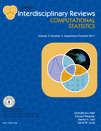 The saga of statistician turned climate science critic Edward Wegman and his protege Yasmin Said has taken yet another strange turn. The pair’s tenure as editors-in-chief at the Wiley journal they founded three years ago quietly came to an unceremonious end recently, while release of the hard-cover encyclopedia based on the journal also appears to have been delayed. Not only that, but it now seems that Yasmin Said’s stint as research assistant professor at George Mason University ended at the same time.
The saga of statistician turned climate science critic Edward Wegman and his protege Yasmin Said has taken yet another strange turn. The pair’s tenure as editors-in-chief at the Wiley journal they founded three years ago quietly came to an unceremonious end recently, while release of the hard-cover encyclopedia based on the journal also appears to have been delayed. Not only that, but it now seems that Yasmin Said’s stint as research assistant professor at George Mason University ended at the same time.
CHANGES AT WIREs COMPUTATIONAL STATISTICS …
 Wiley Interdiscplinary Reviews – Computational Statistics (WIREs Comp Stat) began in 2009 as one of a series Wiley interdiscplinary journals (the WIREs stable has now reached eleven strong and includes WIREs Climate Change). Although WIRES Comp Stat itself is completely unrelated to climate studies, the original trio of editors – Wegman, Said and Rice University statistician David Scott – had collaborated earlier on the highly controversial congressional report on paleoclimatology known as the Wegman Report.
Wiley Interdiscplinary Reviews – Computational Statistics (WIREs Comp Stat) began in 2009 as one of a series Wiley interdiscplinary journals (the WIREs stable has now reached eleven strong and includes WIREs Climate Change). Although WIRES Comp Stat itself is completely unrelated to climate studies, the original trio of editors – Wegman, Said and Rice University statistician David Scott – had collaborated earlier on the highly controversial congressional report on paleoclimatology known as the Wegman Report.
Wegman and Said also penned two major overview articles for the WIREs Comp Stat journal. Last year, I documented extensive copy-and-paste scholarship in Color Theory and Design and, even more shocking, in Roadmap for Optimization, the featured article in the journal’s inaugural issue. That continued a pattern of dubious scholarship seen in the Wegman Report itself, as well as in a followup paper on climate science social networks that was retracted – twice!
Wiley received complaints concerning both WIREs articles, and dealt with them in a most peculiar way: Wegman and Said were allowed (or allowed themselves) a complete “do over” of each article in turn. Dozens of citations were added, while all traces of previously evident copy-and-paste were scrubbed away. Here’s a small sample comparing a section on linear programming in the original version of Roadmap to Tom Ferguson’s Linear Programming: A Concise Introduction, with the large swathe of identical wording highlighted in cyan, and trivial differences in yellow .
That brings us to the current WIREs Comp Stat lineup, where all of a sudden David Scott is alone at the top of the masthead. That’s reflected in the latest author style guide, dated June 30, which also confirms that the change was very recent indeed.
It’s also noteworthy that the editorial board is down to only six members.
- Jerome H. Friedman, Stanford University
- Michael Friendly, York University
- Genshiro Kitagawa, Institute of Statistical Mathematics
- Carlo N. Lauro University of Naples “Federico II”
- Jae C. Lee, Korea University
- James L. Rosenberger, Pennsylvania State University
Back in 2010, there were almost double that number, but five have left in the last year or so. They include:
- Jianqing Fan (Princeton University)
- Xiao-Li Meng (Harvard University)
- Luke Tierney (University of Iowa)
- D. Michael Titterington (University of Glasgow)
- Antony Unwin (University of Augsburg)
WIREs Comp Stat, like all the WIREs journals, was conceived from the start as a “serial encyclopedia”. But as far as I know, only the Encyclopedia of Computational Statistics was also slated for release as an actual hard-cover encyclopedia, with a planned publication date of July 13, 2012 – today!
The Amazon U.K. website still shows the July 2012 publication date, but there is no indication as to when it will actually be released. (Google Books goes one better, happily showing a publication date of October 2010). Nevertheless, Amazon still has the original description.
The Encyclopedia of Computational Statistics (EoCS) draws together material normally identified under the rubric of computational statistics. This includes material drawn from computationally intensive statistical methods such as bootstrapping; data visualization; machine intelligence; density estimation; data mining; pattern recognition; clustering and classification; and computational Bayesian methods such as Markov chain Monte Carlo. …
And Amazon UK is still taking orders, as they have for more than a year, although at £1,108.65 a pop (more than US $ 1700), one wonders how many pre-orders there could possibly be.

Wiley’s placeholder cover
In contrast, the Wiley.com page for the Encyclopedia of Computational Statistics has no release date or description whatsoever but merely notes: “This product is not currently available for purchase from this website”. I can’t even find the front cover anywhere (although Wiley does show the compelling graphic at right).
Not all parts of the Wiley empire have gotten the memo though. Wiley’s Iranian subsidiary, like Amazon UK and other booksellers, still has a release date of July 2012 and the original description.
… AND CHANGES AT GMU
Meanwhile, interesting changes are also afoot at George Mason University. It seems that barely over a week ago, Yasmin Said disappeared completely from the GMU online ‘People Finder” directory, as well as the full GMU directory. Her erstwhile post as Research Assistant Professor in GMU’s School of Physics, Astronomy and Computational Sciences could be seen in the Google cache from June (but even that is gone now).
Wegman and Said had ended up in SPACS after last year’s merger of their former “home” department of Computational and Data Sciences. Said’s departure also leaves the Wegman-led research unit Center for Computational Data Sciences (confusing, I know) down to Wegman and six other professors (each of whom also has a primary “home” posting).
 And, unlike last year, this year’s directory listing shows that the Center no longer even has an online presence; indeed, there is little evidence of much recent activity there on the entire GMU website. All this is in contrast with the heady days of 1997, when the Center had no less than 20 GMU “regular” research faculty, as well as eight “corresponding” research faculty from other institutions, such as Wegman Report co-author David Scott and Wegman Report “reviewer” Enders Robinson. Unlike the global surface temperature record, the Center for Computational Data Sciences has clearly seen a severe decline in the last fifteen years.
And, unlike last year, this year’s directory listing shows that the Center no longer even has an online presence; indeed, there is little evidence of much recent activity there on the entire GMU website. All this is in contrast with the heady days of 1997, when the Center had no less than 20 GMU “regular” research faculty, as well as eight “corresponding” research faculty from other institutions, such as Wegman Report co-author David Scott and Wegman Report “reviewer” Enders Robinson. Unlike the global surface temperature record, the Center for Computational Data Sciences has clearly seen a severe decline in the last fifteen years.
In fact, not only has the Center gone dark, at least on the web, but the erstwhile GMU statistics “Galaxy” server itself has disappeared. Only a year ago, it was billed as the server for “Statistics at George Mason University”. It hosted not only the Center (albeit with badly of date information), but served as a portal to all statistics-related departments at GMU, as well as linking to professional organizations and conferences.
But as of the beginning of this month, the Galaxy front page just had a list of four courses (mostly associated with Wegman in the past), before finally going dark a few days ago.
DEVELOPMENTS AT THE INTERFACE SYMPOSIUM
And that brings us to yet another significant change involving Wegman and Said.
The Interface Symposium on statistical computing dates back to 1967, and George Mason University (and Wegman in particular) have played a leading role since its reorganization as the expanded Interface Foundation in 1988. That involvement included hosting the Interface website at GMU. So when the GMU Galaxy server went offline, the Interface Symposia website went down too. Fortunately, we can trace its much of its recent developments via Google cache and Archive.org.
Over the years, Wegman was a constant presence at Interface and many of his former students participated in various ways (a detailed chronology can be found in Appendix A.6.2 at p. 75 in John Mashey’s magnum opus, Strange Scholarship in the Wegman Report) .
That culminated in the 2010 Seattle conference where Wegman and Said served as co-chairs. Two Said-organized sessions on climate science and policy saw participation from contrarians Fred Singer, Don Easterbrook, Jeff Keuter (of the Marshall Institute) and Said herself holding forth on Climategate. Mark Berliner of Ohio State provided the sole “balance” from the mainstream.
As I noted at the time, this travesty was financially suppported by the computing and graphics sections of the American Statistical Association, as well as the National Institute of Statistical Sciences.
[O]ne of the conference co-chairs, Yasmin Said, accused climate scientists of “the willingness” to “bend the peer review process” and “destroy data”. And one of the invited presenters, Don Easterbrook, goes further and accuses climate scientists of outright scientific fraud …
How can the ASA allow itself to be associated with, let alone give financial grant support to, such a symposium?
Well, perhaps in the end, the ASA couldn’t, although Wegman and Said did return to co-chair the 2011 edition held at the SAS campus in Cary, NC.
In any event, the 2012 edition of Interface was notable for the complete absence of Wegman for the first time in many years; nor was there anyone else from George Mason University. As he did at WIRES Comp Stat, David Scott was there to pick up the pieces, co-chairing a fine program committee, and hosting the conference at Rice University. By all appearances, the result was a compelling event with the theme of Future of Statistical Computing: Internet Scale Data, Flexible Modeling, and Visualization.
AN EVOLVING STORY
To be sure, one can only speculate as to the full context and significance of Wegman and Said’s departure from Wiley, Said’s exit from GMU, and all the other changes. That will likely remain the case even when those organizations finally respond publicly to these developments. Nevertheless, it does seem that there are starting to be consequences for Wegman and Said, whether Wiley and GMU care to admit it or not. And perhaps the coverup attempts will also start to unravel.
Still, the impact of Wegman and Said’s efforts on the politicization of climate science has yet to be addressed.And here, once again, Wegman’s longtime collaborator David Scott has a responsibility to step up once and for all.
True, Scott may well have had nothing to do with the unacceptable scholarship in the background sections of the Wegman Report, or the manifestly biased and deeply flawed analysis at its core. But that is all the more reason for him to finally do the right thing and remove his name from the report.
This story is far from over and I’ll await developments along with everyone else. Meanwhile, I’ll also be focusing future efforts on revisiting Wegman and Said’s benighted analysis of paleoclimatology and the McIntyre-McKitrick “hockey stick” critique, beginning with the ever-shifting and confused definitions of “red noise” within the Wegman Report. Stay tuned.























